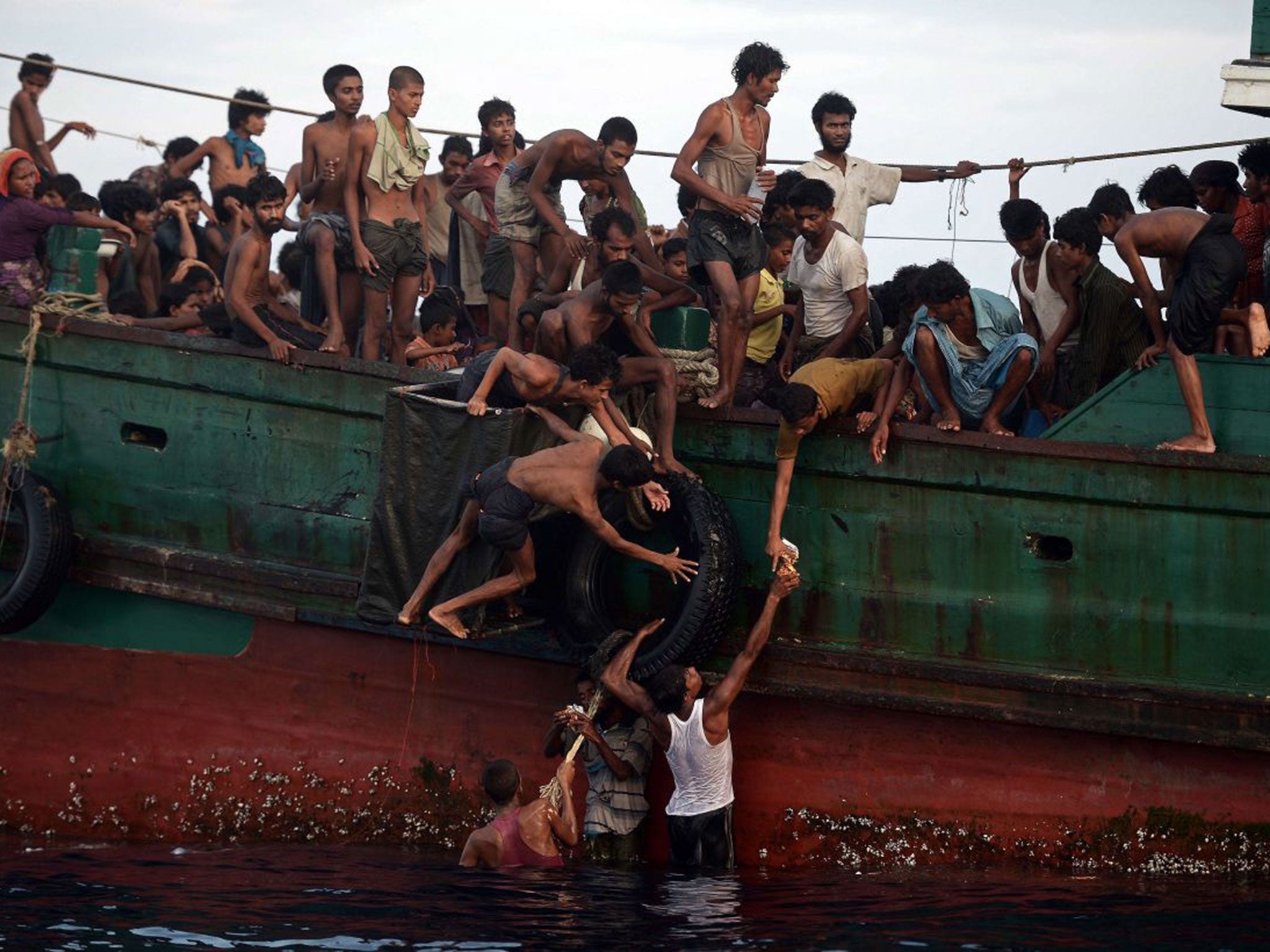Asia's migrant crisis: Thousands of trafficked boat people cast back out to sea by Indonesia, Malaysia and Thailand
Boat-loads of desperate and malnourished refugees from Burma and Bangladesh are being caught in 'a game of maritime ping-pong'

A weather-beaten fishing boat crammed with at least 300 Rohingya refugees from Burma was barred from docking in Thailand on Thursday and towed further out to sea, after Thai authorities provided the passengers with emergency supplies. It was the latest brutal episode in what an International Organisation for Migration spokesman in Bangkok called “a game of maritime ping-pong”, as different South-east Asian countries refused permission to land to ship after ship laden with desperate and malnourished refugees.
On Tuesday, the Indonesian navy turned away a boat crowded with thousands of trafficked refugees, sending it on to Malaysia. On Wednesday, the Malaysian authorities rejected two boats carrying at least 800 fugitives between them. Despite the bans, more than 1,600 people from Burma and Bangladesh have landed in Malaysia and Indonesia since Sunday.
Meanwhile, more than 2,000 Rohingya and Bangladeshis were being cared at a government centre in the Malaysian beach resort of Langkawi. Many of them had reached land by swimming from boats abandoned by traffickers.
The Andaman Sea’s migrant crisis exploded after Thai authorities discovered a mass grave at an abandoned trafficking camp in the far south of the country, close to the Malaysian border, containing the corpses of more than 30 people. Some were in shallow graves while others were covered by blankets in the open. Police reports indicated they were Rohingya from Burma or Bangladesh who had died from disease or starvation while traffickers awaited further payment before smuggling them into Malaysia.
The discovery prompted a crackdown on illegal trafficking camps in southern Thailand. Police found 74 such camps where the traffickers had dumped their charges after ferrying them from the coasts of Burma and Bangladesh. Hundreds of them were rescued. One trawler owner surrendered to the Thai authorities, while an alleged kingpin of the trade, a former chairman of Satun province in the far south of the country, has reportedly gone into hiding in Malaysia.
But in a knock-on effect of the crackdown, other traffickers fearing arrest have abandoned their ships and passengers to their fate. Already some of the migrants have died after spending what they claimed was months at sea. One man on the boat towed away from Thailand on Thursday shouted: “About 10 people died during the journey. We threw their bodies into the water. There are 300 of us. We have been at sea for two months.”
The developing crisis, which has left some 8,000 desperate people wallowing in the Andaman Sea with no port willing to receive them, has brought the international consequences of Burma’s methodical marginalisation of the Muslims of Arakan state who call themselves Rohingya – the Burmese authorities refuse to use the term – to the world’s appalled attention.
Denied both Burmese and Bangladeshi citizenship, forced to live in squalid camps in Arakan state after eruptions of violence between them and their Buddhist neighbours, many Rohingya decide that the risks and horrors involved in being crammed into crude boats are better than staying at home. One Rohingya from Arakan state told The New York Times: “We assumed that danger would come, but there was no other way. We were living in a country that is more dangerous than the sea.”
The mass trafficking has been going on under the authorities’ noses for many years. In particular, conditions for the Rohingya have deteriorated sharply since 2012, when tens of thousands fled their homes after repeated eruptions of violence and were resettled in camps. According to the UNHCR, more than 100,000 members of the Muslim minority group have fled by ship since then.
But now that the issue is in the glare of international attention, the countries involved have vowed to seek a solution. Thailand’s national police chief has proposed setting up holding camps for those awaiting repatriation, but Thai Prime Minister General Prayut Chan-o-cha said other countries and international organisations would also need to get involved. Fifteen affected countries, including Burma, Thailand, Malaysia and Indonesia, will meet international organisations in Bangkok on 29 May to try to thrash out a solution all can sign up to.
It is likely to be a difficult meeting, given Burma’s refusal to accept any blame. Asean, South-east Asia’s regional forum, has strict rules about non-interference in member states’ internal affairs, but Wan Junaidi Tuanku Jaafar, Malaysia’s Deputy Home Minister, said: “We need to send a very strong message to Myanmar [Burma] that they need to treat their people with humanity. We cannot welcome them here. If we continue to welcome them, then hundreds of thousands will come from Myanmar and Bangladesh.”
Phil Robertson, deputy director of Human Rights Watch’s Asia division, said: “Everyone in the neighbourhood knows who started the problem, and [Burma’s capital] Naypyidaw’s refusal to discuss it is infuriating leaders in other capitals, especially as the size of the boat crisis expands.”
U Kyaw Lin Oo, a regional affairs analyst based in Burma, said: “The Myanmar government is getting a bad reputation on this issue, [but] the government will not want to disturb its local political landscape before an election.” Burma is staging general elections in November. “What we have now is a game of maritime ping-pong,” said Joe Lowry, a spokesman for International Organisation for Migration in Bangkok. “If these people aren’t treated and brought to shore soon, we are going to have a boat full of corpses.”
Join our commenting forum
Join thought-provoking conversations, follow other Independent readers and see their replies
Comments
Bookmark popover
Removed from bookmarks